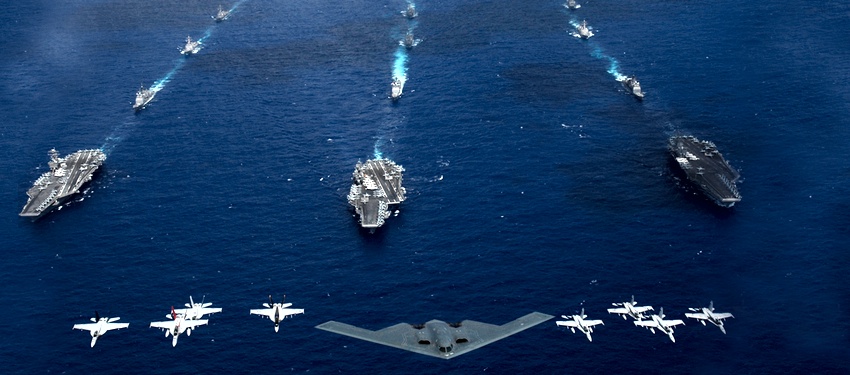
How to recognize a super-company when you see one.
February 11, 2014It took 10,000 years of world history for two superpowers to emerge. But, in just 600 years of industry, the stage has been set for the emergence of the world's first super-company. Wall Street doesn't see it yet, but here's how you can.
What is a super-company? A super-company is to its competitors what a superpower is to other nations. A super-company isn't directly affected by, nor does it function like any of its competitors. Like a superpower, a super-company creates its own rules, and sets an example for others to follow, envy, and even fear. A super-company exists and operates on a geopolitical and economic plane inaccessible to its competitors.
No super-company exists today. If you were to guess which companies have the potential to reach super-company status, who would they be? Exxon? Petro China? GE? Shell? Toyota?
The world is about to see the birth of a super-company, and it's not any of the above. It's Apple.
Time for a reality check.
Let's dispatch with a lingering myth: contrary to what Wall Street and tech pundits say, Apple's existence is not predicated upon the success or failure of their next product. To believe so is foolish. iTunes alone would constitute a Fortune 500 company. Consider the following:
- Apple has $160 billion in the bank, and no debt.
- Of the top 10 largest corporate quarterly earnings in history, Apple has five of them - right next to Gazprom, Shell, Exxon Mobil, et al.
- Apple employs nearly 500,000 people in China manufacturing products bound for all corners of the globe.
- Apple employes over 50,000 people full time in the US and 80,000 worldwide. Nearly 300,000 people are employed full time developing apps for Apple's iOS and Mac App Stores.
- Because it's the largest consumer of flash memory, mobile CPUs and chipsets, glass, and other key components, Apple sets the world's tech commodity pricing through buying power alone.
- Apple doesn't care about Wall Street, and it hasn't for years.
Taken together, these realities already dictate that Apple is playing by a different set of rules. Consider the component market for example (which we've written about before): In 2005, Apple took $1 billion in cash and struck a deal with the leading flash memory manufacturers. Apple bought up the world's supply of flash memory overnight. They paid for it up front in cash in exchange for a healthy discount. In doing so, they undercut every one of their competitors – all of them. Apple constrained global supply and pricing of the commodities its competitors relied upon. Fast-forward nine years to 2014, and the same is still true. Apple is executing the same business practices, but on a grander scale: tens of billions of dollars more, to be sure.
If all your friends jumped off a bridge...
In 2008 the world experienced a recession that wiped out entire economies overnight. The effects of this recession will likely be felt for years to come, depending on where you live. While companies like HP, Dell, IBM, Cisco, and others were shedding jobs, Apple was scooping up the cream of the crop. Why? Because at the time Apple had $40 billion in the bank. It didn't have to care that much about the recession. It had the freedom to hire, expand, and invest in R&D because it had a massive war chest. At $160 billion today, and growing faster than Apple seems capable of issuing dividends, I argue that Apple is recession-proof. Indeed, in a decade or so based on cash growth alone, Apple will be depression-proof.
Right now, in real terms, Apple could afford to bring in $0 revenue for 10 years, fire on all cylinders, not shed a single job, and still have money left in the bank. Considering this, it's silly to think Apple's existence hangs on the success of its next product. If Apple is recession-proof, and potentially depression-proof in the near future, Apple is most definitely dud-product-proof.
Apple has a truly massive global workforce. It's capitalized on cheap labour markets in China and it stands poised to capitalize on Brazil's labour market in the same way with a new factory building iPhones there.
It's easy to forget that while Apple designs unique products, it also designs the manufacturing processes and tooling behind those products. It owns the tools on its OEM partners' factory floors. It protects its hard-earned intellectual property by controlling manufacturing from end-to-end.
Employing hundreds of thousands of people in any given country gives you access to their leaders, presidents, and prime minsters. Employing millions of people in multiple countries ensures Apple holds the upper hand in labour and trade negotiations, while also mitigating its exposure to the effects of national or regional instability.
It's a very, very long game.
Superpowers play a long game. When you operate on a global field, you have to account for regional issues, instabilities, cultures, and outcomes that better resemble a chess board. Apple is investing all over the map and hedging its bets at the same time. It's investing in tooling for massive labour forces, even as it invests heavily in robotics and automated manufacturing. It's expanding its global retail store footprint, while striking more and more deals with regional mobile carriers - most recently (and notably) China Mobile.
Apple doesn't get the credit it deserves for transforming from a company that manufactures niche-market computers, to a company that can sell 50+ million iPhones and 26+ million iPads in a single quarter. That Apple can manufacture 50 million units of any product, and have less than a two-week inventory left over quarter-to-quarter, is nothing short of heroic.
Talk about a long game: Apple capitalized on one industrial revolution (China's), and it's going to capitalize on the next one very soon. The new Mac Pro - the most powerful personal computer ever made, is manufactured almost entirely using robotics and custom processes in Austin, Texas. Make no mistake, this new factory exists for one reason: to perfect the processes and techniques to manufacture products without humans. Apple has the war chest it will take to figure this out. It will be the first consumer technology company to do so. But unlike present-day OEM manufacturing (e.g. companies like Foxconn hiring a million employees in China to make products for dozens of companies), the tooling, processes and techniques that Apple invents for robotic manufacturing will benefit Apple alone. Its competitors and their OEMs will have to figure this out themselves, without the benefit of Apple's war chest, or the know-how it's already built up. In the context of becoming the world's first super-company, these developments are paramount:
- Mastering robotic manufacturing means Apple becomes less reliant on cheap human labour and all social issues that come with.
- Apple will be able to manufacture smaller and smaller products that require precision humans can't deliver. In the coming age of the Internet of Things and wearable computing, this poises Apple uniquely.
- Robotic manufacturing, like all things rooted in technology, will only become faster and cheaper over time.
- Apple will be able to manufacture products faster - and at lower cost - than any of its competitors using human labour.
- Robotic factories can be built based on considerations like energy, shipping, and proximity to raw materials instead of humans.
- Robotics will lead to decentralizing manufacturing capacity, reducing the distance and time between the customer and product, and in turn reducing a product's carbon footprint.
- Apple can build factories anywhere it chooses regardless of labour law. Indeed, labour law becomes largely irrelevant. Need to get around a tariff, VAT, or import ban? Simple: build the factory locally.
The point I'm making here is that Apple sees a revolution coming and it's betting on it in a big way. Wall Street doesn't understand this. Pundits don't understand this. As Apple begins to execute on a long-term strategic plan, 10-25 years out, industry analysts are fixated on its next product release.
Apple's revenue, profits, work force, patent portfolio, talent and financial war chest are staggering. Disregarding these considerations, Wall Street would have you believe that to invest in Apple is to invest in their next hit (or failed product). That's rubbish. To invest in Apple is to invest in the future of consumer technology for years and years to come. To invest in Apple is to make a bet on the world's first super-company.
Other posts by Chris Marriott
- Seeking Backstage Resellers
- Preemptive Multi-Talking -- Johnny and the Liquidators
- Preemptive Multi-Talking -- Pundits are the worst!
- Preemptive Multi-Talking -- WWDC 2016
- Preemptive Multi-Talking -- Of Cash Piles and Job Cuts
- Preemptive Multi-Talking -- 60 Scary Minutes Edition
- Preemptive Multi-Talking -- [R]Evolution Edition
- Preemptive Multi-Talking -- Pinocchio Edition
- Preemptive Multi-Talking -- FBI vs. Apple
- Preemptive Multi-Talking -- 1984 Edition
- Preemptive Multi-Talking -- Earnings Madness Edition
- Preemptive Multi-Talking -- All your passwords are belong to us.
- Preemptive Multi-Talking -- Fog, Fizzle, Flop Edition
- Preemptive Multi-Talking -- FUD Redux Edition
- Preemptive Multi-Talking -- Privacy be Damned Edition
